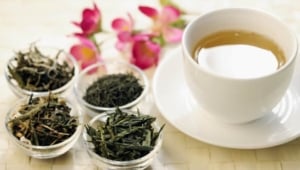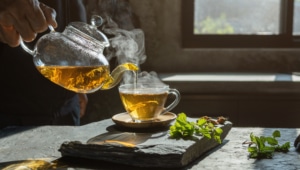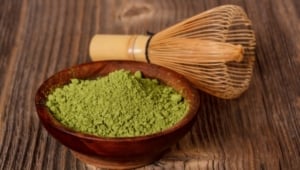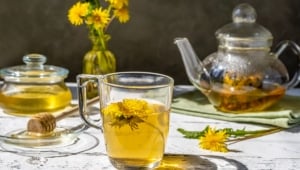9 Health Benefits of Cinnamon Tea & 3 Tips

Cinnamon may be more associated with spiced baking and Christmas treats, but have you tried cinnamon tea? Find here all health benefits of cinnamon tea and potential risks, plus easy tips and hacks.
Some studies have shown that cinnamon is even beneficial in fighting some cancers. It’s great for much more than that, however, offering a wide range of uses that will surprise you.
In short, cinnamon tea makes for a tasty addition to any diet. You’ll just want to make sure you use the right kind of cinnamon, and that you don’t have too much. Read on to find out more.
Interesting Facts about Cinnamon Tea

Interesting Facts about Cinnamon Tea
Cinnamon tea is widely enjoyed in the Middle East and Asia. Cinnamon bark is added to tea for its warming properties, delicious flavoring, and health benefits.
The origins are a little murky, partly because it was so highly prized that cinnamon was a coveted secret. Here are some fascinating facts about cinnamon tea and its origins.
Origin and Where Cinnamon Tea Comes From

Origin and Where Cinnamon Tea Comes From
Cinnamon was first mentioned in Chinese documents in 2.800 BC, but it’s actually native to Sri Lanka. This true cinnamon (or Ceylon cinnamon) was so highly prized that the people of ancient times regarded it as a gift fit for their gods.
The exact points of origin were kept secret by spice traders who wanted to monopolize on this idea.
Cinnamon tea is a popular beverage from both Korea and Lebanon.
Known respectively as gyepi-cha and shaayi bil qirfah wa’l yansoon, cinnamon tea is enjoyed by locals in both countries for its warm flavoring and many health benefits.
Ingredients in Cinnamon Tea

Ingredients in Cinnamon Tea
Cinnamon tea is made simply by placing a stick of cinnamon in hot water or hot black tea.
In Korea, cinnamon tea is made with cassia cinnamon bark (which isn’t true cinnamon as such and isn’t as good for your health as the true Ceylon cinnamon), alongside a little bit of ginger.
It’s then sweetened with either honey or sugar, and garnished with jujubes. The latter is a berry similar to buckthorn.
Lebanese cinnamon tea contains cinnamon sticks or powdered cinnamon and aniseed. It’s sometimes blended with black tea, and sugar may be added to sweeten it.
Nutritional Facts and Calories of Cinnamon Tea

Nutritional Facts and Calories of Cinnamon Tea
Plain cinnamon tea without any added sugar contains around 11 calories per cup. Cinnamon steeped in hot tea also provides a small number of nutrients including potassium, calcium, and iron.
Health Benefits of Drinking Cinnamon Tea

Health Benefits of Drinking Cinnamon Tea
Cinnamon tea offers a multitude of health benefits, some of the main ones we’ll cover below.
With that said, it’s worth noting that higher quality Ceylon cinnamon is much better for you than the widely available cassia cinnamon. This is because Ceylon cinnamon contains less of a chemical called coumarin.
In fact, Ceylon cinnamon contains just 1/250 of the coumarin content of cassia cinnamon. Coumarin can cause a range of bad side effects, most notably bleeds, nausea, diarrhea, loss of appetite and blurred vision.
Stick to Ceylon cinnamon if you can get it, and reap the benefits of this great spice, steeped in a delicious tea.
Cinnamon Tea Fights Inflammation

Cinnamon Tea Fights Inflammation
Cinnamon tea helps reduce inflammation and fights free radicals that cause cell damage. This, alongside cinnamon’s antibacterial properties, helps prevent illnesses and boosts your immune system.
Cinnamon Tea Contains Lots of Antioxidants
Cinnamon contains polyphenols and other antioxidants. Antioxidants help reduce the risk of diseases such as cancers and heart disease. Antioxidants also reduce any damage that is caused by oxidation in the body’s cells.
Cinnamon Tea Can Help Lower Blood Sugar Levels

Cinnamon Tea Can Help Lower Blood Sugar Levels
Some studies have shown a reduction in blood sugar levels with daily consumption of cinnamon. If you do try this, make sure you use Ceylon cinnamon, which doesn’t contain harmful levels of coumarin.
Ceylon cinnamon is said to stimulate an insulin-like reaction in the body, which helps break down sugars in your liver.
Cinnamon Tea Can Help You Lose Weight

Cinnamon Tea Can Help You Lose Weight
As we’ve already noted, cinnamon tea helps regulate your blood sugar levels. It also improves your metabolism. Both of these effects can help you lose weight naturally.
One study on mice also found that it may help fight visceral or ‘hidden’ fat.
All of the above definitely makes cinnamon a promising addition to any diet, so long as it’s used in moderation.
Cinnamon Tea May Help with Cramps and Symptoms of PMS
A study found that cinnamon was more effective than a placebo in relieving menstrual pain in women.
Allegedly, this is due to cinnamon aiding blood circulation, increasing endorphins in your body, and decreasing levels of prostaglandin responsible for causing uterine contractions during your period.
Cinnamon Tea May Fight off Fungi and Bad Bacteria

Cinnamon Tea May Fight off Fungi and Bad Bacteria
Cinnamon tea is anti-bacterial, anti-fungal, and even anti-viral. Cinnamon helps prevent bacteria, viruses, and fungi from growing and fights them off in a variety of infections.
It’s therefore a great addition to your diet if you’re fighting a cold or flu bug of any kind.
May Protect Against Cognitive Impairment and Parkinson’s Disease

May Protect Against Cognitive Impairment and Parkinson’s Disease
Studies on cinnamon’s effects on Alzheimer’s disease are still quite vague and uncertain. However, cinnamon tea may help reverse some cognitive impairment or delay it.
The spice’s antioxidative properties are to blame for this helpful effect. Animal studies have also shown that cinnamon may help normalize levels of neurotransmitters and some brain changes caused by Parkinson’s Disease.
Cinnamon Tea Might Protect Against Premature Skin Aging

Cinnamon Tea Might Protect Against Premature Skin Aging
Cinnamon tea contains lots of antioxidants, which help fight free radicals. As free radicals are partly to blame for aging and associated changes in your skin, cinnamon tea is a great addition to your anti-aging diet regimen.
Cinnamon also helps with your circulation, promoting a healthy blood flow that can give you that desirable skin ‘glow.’
Cinnamon Tea Could Help Kill Some Types of Cancerous Cells
Some promising studies have shown that cinnamon may inhibit tumor cell growth. It even helped kill off some cancerous cells. Ceylon cinnamon specifically may be useful for the prevention or treatment of some types of cancer.
Potential Risks of Cinnamon Tea

Potential Risks of Cinnamon Tea
While cinnamon tea offers plenty of great benefits for your health, the key is in how much you have. Adults shouldn’t consume more than a maximum of 1 teaspoon of cinnamon per day, and children should have significantly less still.
The reason too much cinnamon might be bad for you is a chemical known as ‘coumarin’, of which high levels are present in cassia cinnamon, though much less in Ceylon cinnamon.
A drug known as warfarin is derived from coumarin, and is used to prevent blood clots, though it can cause severe bleeding.
As you can see, too much coumarin usage can cause problems, which is where potential risks with cinnamon tea come in.
With that said, cinnamon tea contains far less coumarin than is necessary to cause any problems. Having it in moderation will cause absolutely no adverse reactions in most people.
Too Much Can Cause Liver Damage

Too Much Can Cause Liver Damage
Too much cinnamon tea could cause liver damage. As little as a teaspoon per day of cassia cinnamon may be toxic to the liver.
Cassia cinnamon is also a potential carcinogen when consumed too frequently. All of this is due to its coumarin content. Enjoy Ceylon cinnamon instead, which offers all of the same benefits with only very little coumarin.
Too Much May Cause Low Blood Sugar Levels
Since cinnamon helps lower your blood sugar levels, too much may also lower them too much. If you tend towards lower blood sugar levels, you may wish to limit your intake of cinnamon tea.
Too Much Can Affect Your Breathing

Too Much Can Affect Your Breathing
Coumarin can cause irritation of your respiratory tract. In short, it may cause breathing difficulties when inhaled. You certainly shouldn’t inhale Ceylon cinnamon (which contains much less coumarin) either, but drinking tea made from it won’t affect your breathing.
Is Cinnamon Tea in Pregnancy Good For You?

Is Cinnamon Tea in Pregnancy Good For You?
Some suggest that cinnamon tea can induce labor, likely due to the high levels of coumarin present in cassia cinnamon. Coumarin can cause bleeding, and is used as a blood thinner.
Whether or not this means it could induce labor is debatable, and it’s generally agreed that any cinnamon is safe to consume in small doses.
However, if you want to be extra safe, stick to the higher quality Ceylon cinnamon, which does not contain as much coumarin.
Make sure you add no more than you’d normally use in cooking, and steer clear of overly strong concoctions.
Benefits of cinnamon tea use in pregnancy include its antioxidants, possible lowering of inflammation in the body, and helping with blood sugar levels, which is particularly helpful if you suffer from gestational diabetes. Cinnamon tea is also said to fight off fungi and bad bacteria.
You may also want to watch your caffeine intake if you’re having black tea with cinnamon. It’s advised that you shouldn’t have more than 200 mg of caffeine per day. Too much can increase risks for complications such as low birthweight and miscarriage.
Simple Recipe for Homemade Apple Cinnamon Tea

Simple Recipe for Homemade Apple Cinnamon Tea
Apple and cinnamon is a lovely, comforting Fall-time tea mixture. It’s refreshing yet warming, and offers all the benefits of both the fresh fruit and cinnamon spice.
Here is a simple recipe to make your own delicious apple cinnamon tea at home.
Ingredients:
- 3 cups of boiling water
- 1 sweet apple
- 1 Ceylon cinnamon stick
- 1 small chunk of ginger (peeled and crushed)
- 1 tbsp of lemon juice
- 2 teabags (black or green)
- 1 tbsp of honey
And here’s how you do it:
- Boil the water and add it to a pot or saucepan.
- Add all of the ingredients to steep for around 5-7 minutes. Continue to simmer the water for a stronger flavor.
- Strain everything into a teapot and serve.
Tips for Drinking and Serving Cinnamon Tea

Tips for Drinking and Serving Cinnamon Tea
Are you convinced by the many health benefits cinnamon tea has to offer? Would you like to make some cinnamon tea at home?
Start with our delicious apple cinnamon tea recipe, then experiment with additional ingredients. Make your cinnamon tea traditionally Korean or Lebanese, or add your own favorite ingredients to make it your own.
Use Ingredients like Ginger, Aniseed, or Jujubes

Use Ingredients like Ginger, Aniseed, or Jujubes
Koreans traditionally add ginger and jujubes to their cinnamon tea. Ginger adds a good level of spice and warmth to any tea, and is great for combating cold and flu symptoms, nausea, and digestive problems.
Jujubes offer high levels of antioxidants, and may help with digestive issues and even sleep. You can buy jujubes at specialty shops or online.
In Lebanon, people like to add aniseed to their cinnamon tea. Aniseed is an interesting herb as it not only brings added warmth and a slightly sweet flavoring to tea, but also has health benefits of its own.
Anise may offer effects similar to estrogen, which could help with menopausal symptoms, migraines, depression, and swelling. It may also help with indigestion and even for repelling bugs, which is possibly why it’s so popular in hot countries.
Make Your Own Blend with Black Tea and Cinnamon

Make Your Own Blend with Black Tea and Cinnamon
You can easily make your own tea blend at home. Simply invest in some high quality loose-leaf black tea. Add it to a jar alongside chunks of Ceylon cinnamon bark or cinnamon powder.
You may also add other dry ingredients such as dried chunks of ginger, aniseed, or dried citrus peel. Store in a cool, dark place. Tea will stay good for at least 6-12 months, and makes an excellent homemade gift, too.
Top tip: use green tea instead of black to give your blend more antioxidants and benefits such as protection against heart diseases, inflammation, and cell damage.
Sweeten Your Cinnamon Tea with Honey or Sugar

Sweeten Your Cinnamon Tea with Honey or Sugar
If you add aniseed to your cinnamon tea it will already have some natural sweetness. If you still prefer your tea a little sweeter, brown sugar or coconut sugar make great additions for sweetness alone.
Adding honey will add sweetness but also extra health benefits: it can help with coughs and colds, combat nausea, and even work as a natural painkiller.
Paired with cinnamon green tea, honey offers large amounts of anti-inflammatory compounds. In other words, it makes your tea even better for you.
- McFlurry Flavors. Best Flavors & Alternatives.
- Oreo Cookie Flavors. Best and Weirdest Flavors.
- Starbucks Refresher. Tips and Best Drinks.
- Jelly Belly Flavors. Best and Grossest.
- Boba Flavors. Best Flavors and Types.
- Pop Tart Flavors. Tasty Alternatives and Best Flavors.





